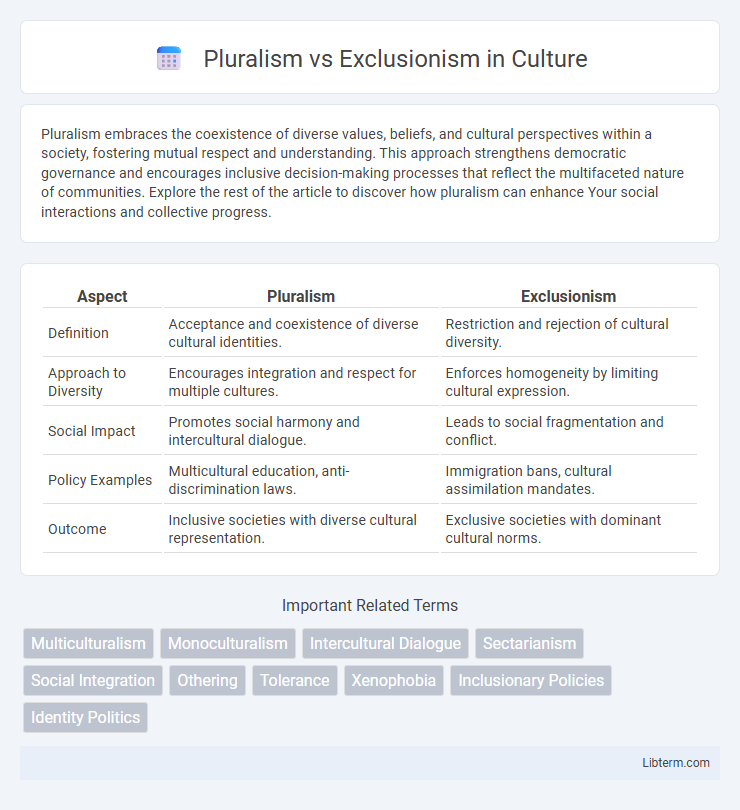Pluralism embraces the coexistence of diverse values, beliefs, and cultural perspectives within a society, fostering mutual respect and understanding. This approach strengthens democratic governance and encourages inclusive decision-making processes that reflect the multifaceted nature of communities. Explore the rest of the article to discover how pluralism can enhance Your social interactions and collective progress.
Table of Comparison
| Aspect | Pluralism | Exclusionism |
|---|---|---|
| Definition | Acceptance and coexistence of diverse cultural identities. | Restriction and rejection of cultural diversity. |
| Approach to Diversity | Encourages integration and respect for multiple cultures. | Enforces homogeneity by limiting cultural expression. |
| Social Impact | Promotes social harmony and intercultural dialogue. | Leads to social fragmentation and conflict. |
| Policy Examples | Multicultural education, anti-discrimination laws. | Immigration bans, cultural assimilation mandates. |
| Outcome | Inclusive societies with diverse cultural representation. | Exclusive societies with dominant cultural norms. |
Understanding Pluralism: Embracing Diversity
Pluralism emphasizes the recognition and respect of diverse cultural, religious, and social identities within a society, promoting inclusivity and equal participation for all groups. It fosters a framework where differences coexist peacefully without marginalization, encouraging dialogue and mutual understanding. Embracing pluralism strengthens social cohesion by valuing diversity as a source of innovation and collective growth rather than division.
Defining Exclusionism: Barriers to Inclusion
Exclusionism refers to policies or attitudes that create barriers to participation or membership within a group, limiting access based on race, ethnicity, religion, or social status. These barriers often manifest through discriminatory practices, social segregation, and institutional policies that prevent marginalized populations from fully engaging in societal, political, or economic opportunities. Understanding exclusionism is crucial for addressing systemic inequality and fostering inclusive frameworks that promote equal rights and representation.
Historical Context: Pluralism and Exclusionism in Society
Pluralism and exclusionism have shaped societies throughout history by influencing social cohesion and group dynamics. Pluralism promotes coexistence and recognition of diverse cultural, religious, and ethnic groups, evident in multicultural empires like the Ottoman Empire and contemporary democratic states. In contrast, exclusionism enforces boundaries that marginalize minority groups, as seen in apartheid-era South Africa and segregation policies in the United States, often leading to social conflict and systemic inequality.
Key Principles of Pluralism
Pluralism emphasizes the coexistence and mutual respect of diverse cultural, religious, and social groups within a society, promoting inclusion and equal participation. Key principles of pluralism include recognition of diversity as a societal asset, support for dialogue and cooperation among different groups, and protection of minority rights. This approach fosters social harmony by encouraging understanding and integration rather than segregation or exclusion.
Core Beliefs Driving Exclusionism
Core beliefs driving exclusionism center on the conviction that social, cultural, or religious homogeneity preserves group identity and prevents perceived threats from outsiders. Exclusionists often emphasize the importance of maintaining traditional values and boundaries, fearing that diversity may undermine social cohesion or dilute established norms. These beliefs prioritize in-group loyalty and view pluralism as a challenge to security, unity, and cultural purity.
Sociopolitical Impacts of Pluralistic Approaches
Pluralism fosters sociopolitical stability by embracing diversity and encouraging inclusive governance, which enhances democratic participation and reduces social conflict. It promotes equitable representation of multiple ethnic, religious, and cultural groups, thereby strengthening social cohesion and collective identity within societies. Pluralistic approaches often lead to policies that protect minority rights and support dialogue across differences, contributing to more resilient and adaptable political systems.
Consequences of Exclusionist Policies
Exclusionist policies often lead to social fragmentation and increased tensions between different community groups, undermining social cohesion and stability. Marginalized populations experience reduced access to resources, education, and political participation, which perpetuates inequality and fuels resentment. These policies can also hinder economic growth by limiting diversity-driven innovation and reducing the overall talent pool within a society.
Case Studies: Pluralism vs Exclusionism in Practice
Case studies on pluralism versus exclusionism reveal how societies manage diversity and integration differently, with pluralism promoting coexistence and mutual respect among varied cultural groups, while exclusionism favors restrictive policies that limit minority rights and participation. Examples such as Canada's multicultural framework versus France's assimilationist approach illustrate pluralism's emphasis on cultural recognition compared to exclusionism's focus on uniform national identity. These case studies emphasize the impact of policy choices on social cohesion, minority empowerment, and long-term stability.
Pluralism and Social Harmony: Building Inclusive Communities
Pluralism fosters social harmony by encouraging diverse cultural, religious, and ethnic groups to coexist respectfully within a community, promoting mutual understanding and cooperation. Inclusive communities built on pluralistic values benefit from shared decision-making, equitable representation, and open dialogue, which reduce social conflicts and enhance collective well-being. Embracing pluralism strengthens social cohesion by validating multiple identities and creating spaces where differences are seen as assets rather than threats.
Overcoming Exclusionism: Strategies for Promoting Pluralism
Promoting pluralism requires implementing inclusive policies that recognize and celebrate diverse cultural identities while ensuring equal rights and opportunities for all groups. Community engagement initiatives and intercultural dialogue foster mutual understanding and reduce prejudices that fuel exclusionism. Educational reforms emphasizing empathy and global citizenship further support the transition from exclusionary practices to a pluralistic society.
Pluralism Infographic

 libterm.com
libterm.com